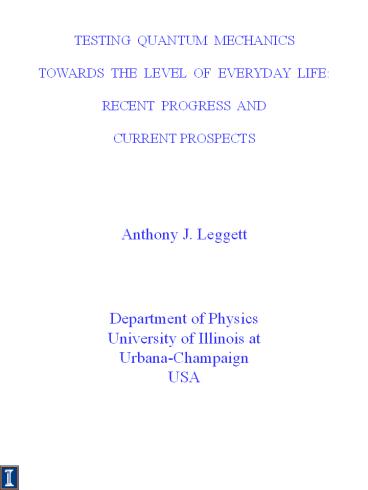FP 0 - PowerPoint PPT Presentation
1 / 17
Title:
FP 0
Description:
TESTING QUANTUM MECHANICS TOWARDS THE LEVEL OF EVERYDAY LIFE: RECENT PROGRESS AND CURRENT PROSPECTS Anthony J. Leggett Department of Physics – PowerPoint PPT presentation
Number of Views:77
Avg rating:3.0/5.0
Title: FP 0
1
TESTING QUANTUM MECHANICSTOWARDS THE LEVEL
OF EVERYDAY LIFERECENT PROGRESS ANDCURRENT
PROSPECTS Anthony J. Leggett Department of
PhysicsUniversity of Illinois atUrbana-Champaign
USA
2
MESO/MACROSCOPIC TESTS OF QM MOTIVATION
At microlevel (a) ? ? ? ? quantum
superposition ? ? (b) ? ? OR ?
? classical mixture ? how do we know?
Interference
At macrolevel (a) quantum
superposition OR (b) OR macrorealism
large number of particles behavedifferently in
two branches
3
- The Search for QIMDS
- Molecular diffraction
- (a.) Beam does not have to be monochromated
- (b.) Which-way effects? Oven is at 9001000
K ? many vibrational modes excited 4 modes
infrared active ? absorb/emit several radiation
quanta on passage through apparatus! - Why doesnt this destroy interference?
100 nm
C60
z
I(z) ?
z
Note
__________________________________Arndt et al.,
Nature 401, 680 (1999) Nairz et al., Am. J.
Phys. 71, 319 (2003).
4
- The Search for QIMDS (cont.)
- Magnetic biomolecules
- Raw data ?(?) and noise spectrum above 200 mK,
featureless below 300 mK, sharp peak at 1 MHz
(?res)
Apoferritin sheath(magnetically inert)
? ? ? ? ? ? ? ? ? ? ? ? . . . .
(5000 Fe3 spins, mostlyAF but slight
ferrimagnetic tendency) (M200?B)
? ? ? ? ?
(isotropic)exchange en.
no. of spins uniaxial anisotropy
? no. of spins, exptly.
adjustable
Nb data is on physical ensemble, i.e., only
total magnetization measured.
S. Gider et al., Science 268, 77 (1995).
5
The Search for QIMDS (cont.) 3. Quantum-optical
systems for each sample separately, and also
for total
2
1
1012 Cs atoms
?
so, if set up a situation s.t.
must have but may have (anal. of EPR)
__________________________________B. Julsgaard
et al., Nature 41, 400 (2001) E. Polzik, Physics
World 15, 33 (2002)
6
Interpretation of idealized expt. of this
type (QM theory ?)
But,
exactly anticorrelated with
- state is either superposition or mixture of
n,ngt - but mixture will not give ()
- ? state must be of form
value of value of Jx1 Jx2
- with appreciable weight for n ? N1/2. ? high
disconnectivity - Note
- QM used essentially in argument
- D N1/2 not N.(prob. generic to this kind of
expt.)
7
The Search for QIMDS (cont.) 4. Superconducting
devices ( not all devices which are of
interest for quantum computing are of
interest for QIMDS) Advantages classical
dynamics of macrovariable v. well understood
intrinsic dissipation (can be made) v. low well
developed technology (non-) scaling of S
(action) with D.
bulk superconductor
RF SQUID
Josephson junction
trapped flux
London penetration depth
Macroscopic variable is trapped flux ?or
circulating current I
8
Josephson circuits
9
(No Transcript)
10
WHAT IS THE DISCONNECTIVITY D
(SCHRÖDINGERS-CATTINESS)OF THE STATES
OBSERVED IN QIMDS EXPERIMENTS?
i.e., how many microscopic entities are
behaving differentlyin the two branches of the
superposition?
no. of C. pairs
- naïve approach
mutually orthogonal C. pair w.f.
(b) how many single electrons do we need to
displace in momentum space to get from ?? to ?? ?
(Korsbakken et al., preprint, Nov. 08)
(c) macroscopic eigenvalue of 2-particle density
matrix (corresponding to (fairly) orthogonal
states in 2 branches)
11
SYSTEM
(1041010)
1019 (1031015)
12
- More possibilities for QIMDS
- BECs of ultracold alkali gasesBose-Einstein
condensates
(Gross-Pitaevskii)
Ordinary GP state
Schrödinger-cat state (favored if interactions
attractive)
- problems
- extremely sensitive to well asymmetry ?? (energy
stabilizing arg (a/b) tN exp NB/?)so ??
needs to be exply small in N - detection tomography unviable for N1,? need to
do time-sequence experiments (as in SQUIDS), but
period v. sensitive e.g. to exact value of N
13
More possibilities for QIMDS (cont) (b) MEMS
micro-electromechanical systems
Naïve picture
?x
external drive
?
O
fixedsuspension
massM
- M 1018 kg (NEMS) 1021 kg (C nanotube)
- O 2p 108 Hz
- Teq ? O / kB 5 mK , x0 1012 m
- rms groundstate displacement
- Actually
? ? x
d
In practice, ?x d.
Problem simple harmonic oscillator!(One)
solution couple to strongly nonlinear
microscopic system, e.g. trapped ion.
(Wineland) Can we test GRWP/Penrose dynamical
reduction theories?
14
WHAT HAVE WE SEEN SO FAR?
- If we interpret raw data in QM terms, then can
conclude we have a quantum superposition rather
than a mixture of meso/macroscopically distinct
states. However, only 1 degree of freedom
involved. - Do data exclude general hypothesis of
macrorealism?NO - Do data exclude specific macrorealistic
theories?e.g. GRWP ? Ghirardi, Rimini, Weber,
PearleNO (fullerene diffraction N not large
enough, SQUIDS no displacement of COM between
branches)Would MEMS experiments (if in
agreement with QM) exclude GRWP?alas? do
not gain by going to larger ?x (and small ?x
may not be enough to test GRWP)
15
HOW CONFIDENT ARE WE ABOUT (STANDARD QMl)
DECOHERENCE RATE? Theory (a) model environment
by oscillator bath (may be questionable) (b)
Eliminate environment by standard Feynman-Vernon
type calculation (seems foolproof) Result (for
SHO) ARE WE SURE THIS IS RIGHT? Tested (to
an extent) in cavity QED never tested (?) on
MEMS. Fairly urgent priority!
provided kBT?O
zero-point rms displacement
energy relaxation rate (O/Q)
16
S. Aaronson, STOC 2004, p. 118.
17
Df
- Then,
- Any macrorealistic theory K?2
- Quantum mechanics, ideal K2.8
- Quantum mechanics, with all the Kgt2 (but
lt2.8)real-life complications - Thus to extent analysis of (c) within quantum
mechanics is reliable, can force nature to choose
between macrorealism and quantum mechanics! - Possible outcomes
- Too much noise ? KQM lt2
- Kgt2 ? macrorealism refuted
- Klt2 ? !































